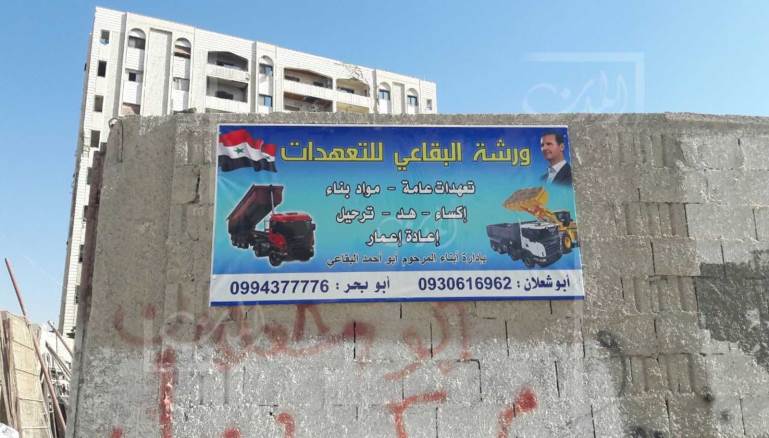A former commander in the First Brigade, Muawiyeh al-Buqai, known as “Abou Bahar”, who now works as part of Military Security, has established a factory in the Barzeh district of Damascus, which makes building materials. Since August, Bahar has been preparing his factory — “the center” as he likes to call it — and built walls around the land in the heart of the Barzeh district with large metal doors. Abou Bahar rents the primary materials from the factory of Abou al-Teeb, the former leader of the First Brigade in an area known as al-Makaser area in the Barzeh district.
Following a ban by the regime on the movement or manufacturing of building materials in destroyed areas of the Damascus countryside, Abou al-Teeb has found himself in trouble with people who want to partner with Abou Bahar, one of whom informed Military Security about Bahar’s factory. The agency monitored the area at night, and witnessed materials being brought from Abou al-Teeb’s factory to Abou Bahar’s factory. Abou Bahar was summoned by his colleagues in the Military Security and an investigation was opened in which Colonel Hisham from the Air Force Intelligence branch in Harasta, and a partner of Abou Bahar’s, was implicated.
Once the investigation against Abou Bahar began, he called on the wife of an old regime veteran, known as ‘The Doctor’ to intervene in the matter. The Doctor had played a role in the reconciliations in Barzeh, and had good relations with former commanders in the opposition, who were now part of the regime’s militia or part of her charity.
The Doctor owns a large group of companies which make clothes and makeup, and she is the president of a “volunteer charity team” which gives assistance to regime forces on the frontlines and helps dig trenches and tunnels alongside regime forces during the fighting. The Doctor’s team became prominent in recent years as cover for illegal activities.
When she intervened on behalf of Abou Bahar, the Doctor became an official partner in his factory, with a monthly financial share in exchange for protection. The mediation from Colonel Hisham, the other partner in the factory, also pushed security forces to intervene to defend it — of course in exchange for monthly financial shares.
The entry of these intermediaries to protect Abou Bahar and Colonel Hisham’s factory pushed the factory’s work forward very quickly, and it became a center for selling building materials to the people of Barzeh, al-Tell, Maaraba and al-Basatin, and even exporting outside Damascus.
Sources told Al-Modon that Abou Bahar left with a militia group towards the Damascus desert, far from the problems that had plagued him, and managed to capture two members of the Islamic State, both with foreign citizenships. He brought them as a gift to the Head of the 215th Assault Branch in the Military Security in exchange for ignoring his factory.
With all his problems at an end, Abou Bahar was free to work openly again. The profits from the factory were split between the three partners: The Doctor, Abou Bahar and Colonel Hisham. The shares were divided with 40 percent to Colonel Hisham in exchange for protection and the role of his troops in transporting the materials and loading them; 20 percent to The Doctor; and 40 percent for Abou Bahar, the owner of the factory.
Abou Bahar wanted to limit further suspicions about the source of the money. In Barzeh district he put out the message that he was looking for people to invest their money with him. He intended to give the people money, so that they would then invest it into the factory. He then went to buy additional equipment for the factory, and said that they belonged to the civilians who invested their money with him.
Al-Modon’s sources said that Abou Bahar and the Colonel are currently working to open a line to sell their products in the cities and towns of eastern Ghouta, and to monopolize the market through a partnership with officers from the General Intelligence Directorate, which is responsible for Ghouta, and the surrounding checkpoints. These checkpoints are currently being used by other traders to smuggle building materials from Ghouta, after fines were imposed on “every grain of sand” entering Ghouta’s cities.
Sources told Al-Modon that Abou Bahar had received threats from the Shalish family, who have contracted building and construction work in the al-Qaboun and western Harasta areas recently after the removal of the businessman Mohamed Hamshou, who is close to Maher al-Assad. The Shalish family threatened Abou Bahar directly after he grew close to the sector they control. They warned against any attempts to smuggle building materials into the area, whose residents have begun to gradually return and repair their farms, land, and possessions.
This article was translated and edited by The Syrian Observer. Responsibility for the information and views set out in this article lies entirely with the author.


